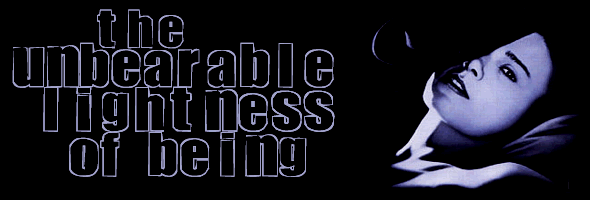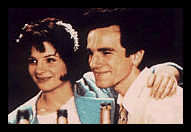
Color, 1988, 172 mins. Directed by Philip Kaufman
Starring Daniel Day-Lewis, Juliette Binoche, Lena Olin, Derek de Lint, Erland Josephson / Produced by Saul Zaentz / Written by Philip Kaufman and Jean-Claude Carriere / Cinematography by Sven Nykvist
Format: DVD - Criterion (MSRP $39.95)
Letterboxed (1.85:1) (16x9 enhanced) / Digital Digital 4.0
Tomas (Daniel Day-Lewis, in his critical breakthrough role following My Beautiful Laundrette), a young doctor living in Prague in the late '60s, enjoys a promiscuous lifestyle thanks to a bevy of beautiful female patients passing through his door. His most constant lover, Sabina (Lena Olin), offers him physical and intellectual - but not emotional - satisfaction. While Kaufman experimented with the supernatural in his remake of Invasion of the Body Snatchers, his films more often possess a vague spiritual undercurrent which never quite manifests itself as something so obvious as a ghost or an elaborate special effect. Henry & June in particular seems to grow out of this film, which establishes sexual contact as one of the many means by which people communicate and build bonds which carry forth over vast distances and even time itself. The temporal manipulations of the final twenty minutes create a powerful effect in willing viewers which lingers long after the film has finished -- indeed, after the last shot, one can easily get the feeling of passing into a strange, ethereal, and optimistic new plane. The performances are all pitch perfect, with Day-Lewis adopting a convincing Slavik accent. Some critics complained about the amount of sex and nudity throughout the film, though most of the sensuality is largely created in the viewer's mind. Nevertheless, Orion's original spicy video art landed this in the adult section of more than a few mainstream video stores.
Following a brief theatrical run, most of the film's loyal following discovered it on home video in an overly dark, Macrovision-smeared VHS version later reissued in somewhat better form on laserdisc by Orion. Criterion eventually released it on laserdisc in an improved transfer which still looks murky compared to the new DVD. This anamorphic transfer finally resembles the big screen presentation -- dense layers of white light, soft textured fabrics, and powdery landscapes. The Dolby surround soundtrack offers little in the way of separation effects, but the predominantly classical soundtrack seems fine, offering some basic stereo delineation like the original theatrical mix. Kaufman, who is tackling a film with Geoffrey Rush as the Marquis De Sade now that he's already conquered Henry Miller, provides an informative, extremely subdued commentary track in which he discusses his techniques for communicating with the actors and trying to convey the difficult concepts of Kundera's novel; the fact that he manages to remain lively and lucid for the entire three hour running time is something of a feat in itself.
Philosophical novels usually make for very bad and pretentious cinema, with only the occasional fluke like Slaughterhouse-Five surviving the process from contemplative written word to concrete visual image. Fortunately, Milan Kundera's breathtaking novel, The Unbearable Lightness of Being, is another of those rare survivors, thanks to Philip Kaufman's intelligent, understated direction and a marvelous ensemble cast. While those expecting a perfect replica of the book may be disappointed (the title, for instance, will be virtually meangingless for anyone who hasn't read it), this fascinating film easily deserves the Criterion treatment, which it has received in abundance.
 During a vacation at a spa, Tomas meets Tereza (a very young Juliette Binoche), who strikes a resonant chord deep within him. They meet again in Prague, and while Tomas has misgivings about carrying on two relationships at the same time, the two women establish their own unique rapport. Tomas and Tereza grow closer as Sabina becomes entangled with the less charismatic Franz (Stealing Heaven's Derek De Lint). Their idyllic existence is shattered when the Soviet Union invades Prague, and all of them must adjust in their own way to the drastic new impositions being forced upon their lives.
During a vacation at a spa, Tomas meets Tereza (a very young Juliette Binoche), who strikes a resonant chord deep within him. They meet again in Prague, and while Tomas has misgivings about carrying on two relationships at the same time, the two women establish their own unique rapport. Tomas and Tereza grow closer as Sabina becomes entangled with the less charismatic Franz (Stealing Heaven's Derek De Lint). Their idyllic existence is shattered when the Soviet Union invades Prague, and all of them must adjust in their own way to the drastic new impositions being forced upon their lives.
